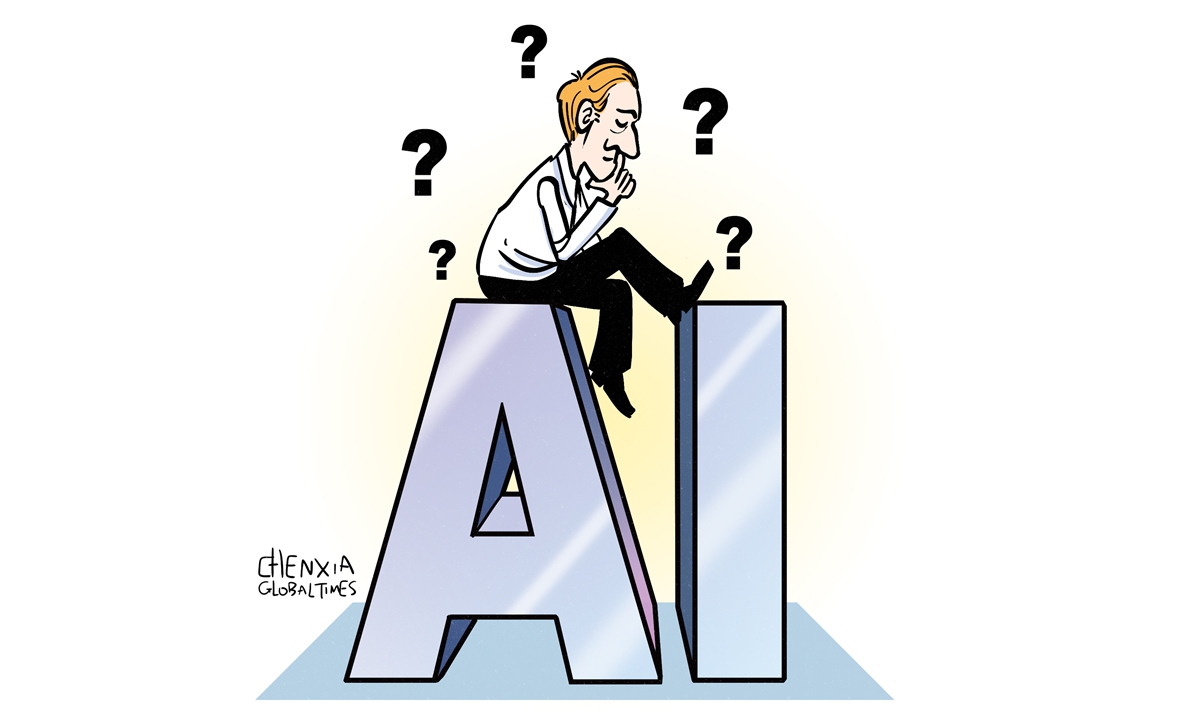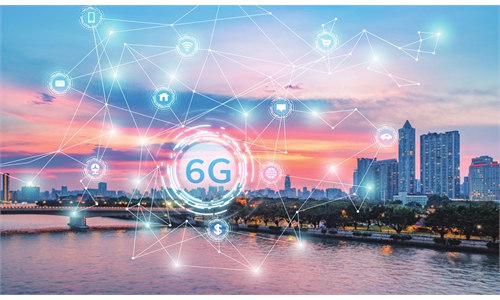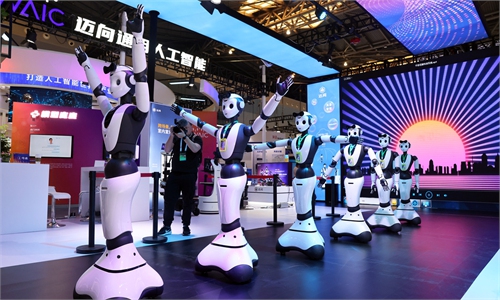
Illustration: Chen Xia/Global Times
Since the release of OpenAI's ChatGPT in late 2022, generative AI has made its way into our daily lives, as scientists claim the new technology - just like the society's ubiquitous connection to the internet - has the potential to transform the way all businesses and organizations operate and iterate.Now various types of AI programmed software systems or chatbots have begun encroaching into clerical work, newsrooms, classrooms, courtrooms, hospitals, customer call services and more areas of our daily life, helping tackle the so-called repetitive or customary work.
We're still at the very early stages of another potentially "disruptive" tech revolution. Will the new technology has the transformative power to reshape our work, our ideas and our thinking, and level the playing field for all competitive industrial lines and services? Maybe we had better keep our eyes wide open over the coming three to five years to see how the generative AI evolves and changes the way we live.
It is true that many high-value use cases for generative AI are now fast emerging that significantly improve efficiency of production and services. Company executives and organization leaders are required to get acquainted with the latest evolutions and understand the technology's implications for their businesses and organizations, in order to provide important decisions to define their own AI-related development strategy and action plans.
For an example, the British telecommunications giant BT Group announced in May that it will try to ramp up operational efficiency by cutting a total of 55,000 jobs by 2030 as the company is increasingly relying on AI solutions. IBM said that AI would affect many service jobs in the company, but the technology is expected to create new AI-related engineering jobs too. And, Google is reportedly testing a product that uses generative AI to take in basics of current events and produce news stories with not-complex analyses, pitching it to news organizations including the New York Times and the Washington Post.
Currently, the generative AI investment frenzy is enveloping China too. Industry giants including Tencent, Alibaba, Huawei and Baidu have all outlined their investment and progress they're making with the development of AI and other foundation models, which points to an escalating global race to lead in AI-related innovations.
As hype around the new technology now reaches dizzying heights, some industry experts note that generative AI could magnify the "winner takes most if not all" narrative, so everyone is rolling up sleeves not to be left behind in making use of the technology.
However, the opponents are bemoaning the negative impact of the technology. "AI is more dangerous than, say, mismanaged aircraft design, or production maintenance, or bad car production…it has the potential of civilization destruction," said Elon Musk, noting the world's AI labs are currently locked in an out-of-control race to develop and deploy machine learning systems "that no one, not even their creators, can understand, predict, or reliably control," according to media reports.
In the US, the Center for AI and Digital Policy (CAIDP) recently filed a complaint with the Federal Trade Commission against ChatGPT-4, claiming it to be "a risk to public safety," and urged the US government to investigate its maker for endangering consumers. CAIDP noted that ChatGPT-4 has the potential for abuse in "disinformation", "proliferation of conventional and unconventional weapons" and more hazardous scenarios, media reports said.
Last Tuesday, the UN Security Council for the first time debated the threat of AI , and Secretary General Antonio Guterres urged for the establishment of a global watchdog to oversee the new technology. He warned the AI may provide a path for criminals, terrorists and other actors intent on causing "death and destruction, widespread trauma and deep psychological damage on an unimaginable scale."
And, generative AI is very likely to be a serious job-killer, as automation always eliminates simple and repetitive jobs. To some people, AI feels like a ticking time bomb, almost certain to eat away at their precious job opportunities. A majority of the call center workers surveyed by the US Cornell University in a recent survey said they felt it was likely that increased use of chatbots would "lead to layoffs within the next two years," according to media reports.
Others claim that generative AI and the so-called foundation models are actually computing programs trained on vast amounts of data in order to solve a wide range of tasks. In that process, personal data security could be sacrificed. For instance, the US Federal Trade Commission is examining Whether OpenAI had engaged in unfair or deceptive privacy or data security practices which pose risks of harm to consumers.
General AI as a new technology has the full competitive potential to significantly revamp, improve and positively reshape our work and life, therefore some levels of "regulatory protection" is warranted in the initial phase of this nascent technology.
The technology calls for building the right ecosystem, deployment model, skills, scrutiny and governance to guarantee generative AI's righteous or healthy development. An international governance system under the auspice of the UN is also plausible. Whoever found to use the new technology to make and disburse disinformation, manipulate other groups or countries, or even making automated weapons of war to blackmail or kill the innocent should be stopped.
If new technologies including the generative AI are allowed to develop without proper regulation and guidance, problems such as false information, data breaches, cyber-attacks and other more severe incidences will be unavoidable, which will cause great risks to individuals and institutions. Therefore, from a global perspective, major countries should strengthen coordination and cooperation, jointly explore the best way of governance over AI, and build a credible AI ecosystem to enhance the reliability of the evolving technology to make sure it brings benefits not hazards to the world.
The author is an editor with the Global Times. bizopinion@globaltimes.com.cn



